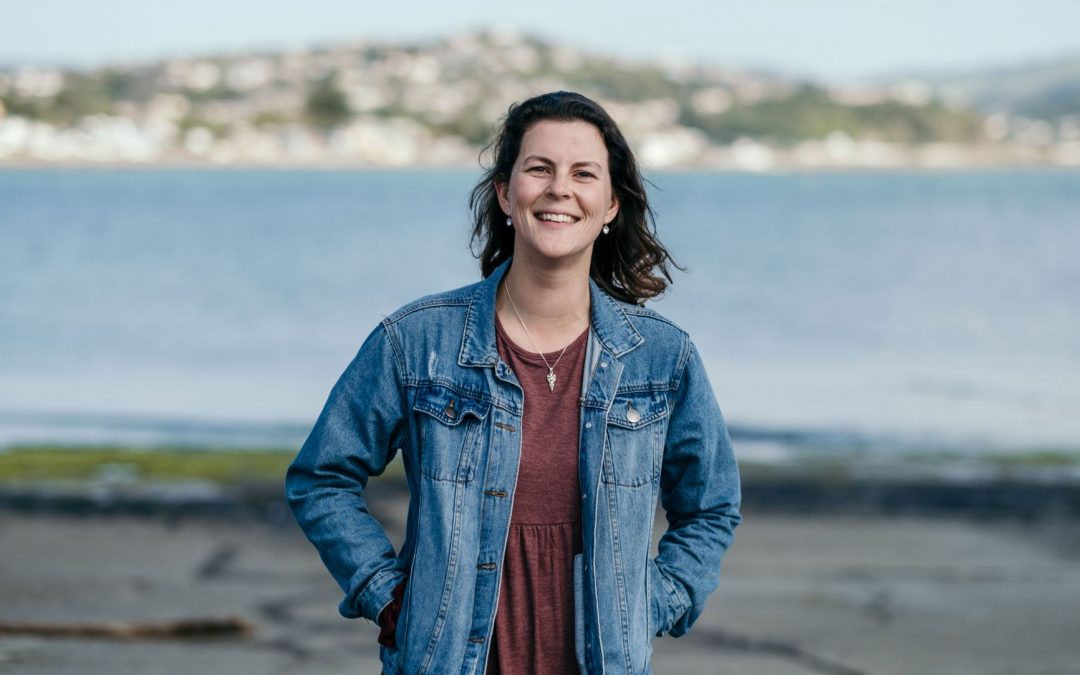Rachel Charlesworth joined Cuttriss Consultants as a graduate surveyor in 2018, following summer internships in 2015-2016 and then finishing her studies. A love of the outdoors, combined with an interest in maths and geography, plus a timely visit from Otago University, inspired Rachel to become a surveyor.
From surveying the sand on Wellington’s iconic Oriental Bay Beach; conducting area surveying for an urban medical centre; project surveying for residential subdivisions, to being followed around by cows in a field as she works – it’s all part of the job for Rachel!
“Cuttriss Consultants offers opportunities for graduates to work on a range of multi-disciplinary projects, in a supportive environment while they work towards becoming licenced Cadastral Surveyors. Rachel is a fantastic member of our team and we are excited to watch her progress in her career,” says Nicola Todd, Director at Cuttriss Consultants.
We asked Rachel some questions to understand a day in the life of a graduate surveyor at Cuttriss
What is your role at Cuttriss?
As a graduate Surveyor, I am involved in conducting and preparing topographical, land transfer and construction set-out surveys. I also get to dip my feet into a bit of planning and engineering work too.
I’m currently working on a lease area survey for a large two storey medical centre that’s under development. This work is quite different to my other jobs because the fieldwork is all done indoors. We are essentially measuring all the internal walls inside the building to be able to calculate and provide lease areas for the finished development. It’s taking a bit of work over some weekends to make real progress on the survey but we’re getting there!
I’m also working as the project surveyor for a couple of residential subdivisions of around 30 lots. This work involves lots of communication between our engineers and the contractors on site. I act as a link between the two to make sure the engineering design that has been created for the site gets constructed in the right place. Whilst this work can be challenging at times, it is great to have the experience on these kinds of jobs, dealing with different people and to learn more about project management.
What do you enjoy about being a surveyor at Cuttriss?
One of the best things would be the variety of work I get to do. Some days I will be outside working on a topographical survey of a beach, placing boundary marks for a subdivision, or chopping my way through bush and digging up the ground in search of survey marks. Other days, I am in the office processing my work or trying my hand at some engineering design and resource consent application writing.
Another great thing about being a surveyor is the different sites you get to visit and survey. I have visited places from rural sites, where I was followed around by various farm animals to dense urban areas in town, where I have had to do some surveying for large scale apartment developments. The contrast you get in the work is great.
What inspired you to become a surveyor?
To be honest I had no idea what surveying was until about half way through my last year of high school, We had a careers advisor from Otago University come and talk to us about different career options. He included surveying in this talk and mentioned that if you liked the outdoors, and subjects such as maths and geography, then it could be a good fit. I was pretty interested after that. Following a bit more investigation into what it was, I packed my bags and headed down south to start my surveying degree. It didn’t take me long to get hooked on the survey life!
Where did you study and what qualifications do you have?
I studied at the University of Otago in Dunedin and graduated with a Bachelor of Surveying with Distinction. Otago University is the only place in New Zealand that offers the Bachelor of Surveying course.
What was your career path leading to Cuttriss?
I started working at Cuttriss at the end of my second year of University as a summer student. I spent two summers during my University holidays working at Cuttriss, and then was offered a full time job for when I graduated. It was great to be able to transition to a full time job where I already knew the work and the people and also knew that I would enjoy myself. Since then I have learnt a lot and am starting on the path of becoming a Licensed Cadastral Surveyor, which is the next step in my career. I have already passed the laws and regulations exam this year so fingers crossed the rest of the process goes well!
What does a typical day look like for you?
A typical day for me consists of a bit of field work such as setting out the roads for one particular subdivision I am working on. When I’m on site I am usually asked to put in some extra marks for the contractors to help with other tasks such as where to build fences, lay stormwater drains etc. It is always something different. This will usually take the most part of the day, so after a cheeky pie it’s back to the office to process the work I have done. It is important as a surveyor to check the set out work we have done so that contractors are not constructing things in the wrong place.
What are some key strengths/skills needed to study surveying?
Good communication skills are important, both written and verbal. You will find that you have to talk to all sorts of different people, from architects to contractors to clients and even angry neighbours. Being a good communicator and able to diffuse tense situations definitely helps here!
Another good skill to have is attention to detail. It is really important in surveying to thoroughly check all the work we do, and ensure that all the details of a design are being followed.
What advice do you have for anyone considering becoming a surveyor?
Having some work experience as a surveyor’s assistant before starting the degree would definitely benefit anyone considering it as a career. I started the degree knowing next to nothing about the work or industry – to start with some base knowledge would have been very helpful.
Because surveying is still a largely male dominated profession, I would also offer advice to any women out there who are considering this career to just go for it. I used to be worried about things such as whether I would be able to engage with contractors easily or have the strength to set out lots of marks at a time. Whilst I have encountered difficulties at times, they do not stop me from doing my job and doing it well. It is a very rewarding field to be in and the support you get from both your peers at University and your colleagues once you start working is awesome.
A surveyor can be a very rewarding career. Learn more about careers at Cuttriss or contact us for more information.




